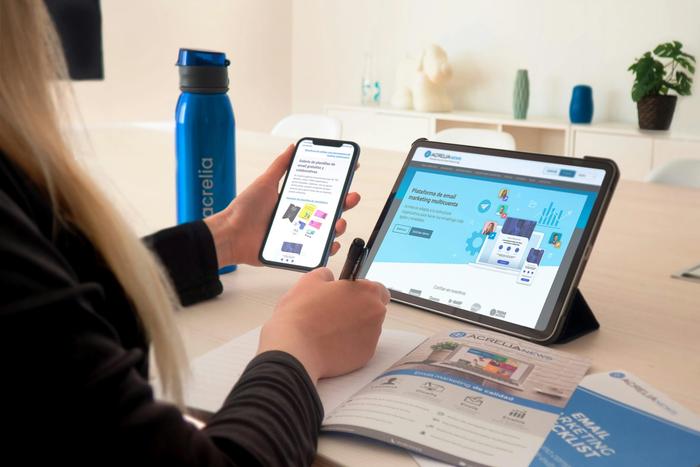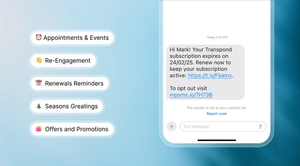Small businesses are constantly seeking cost-effective ways to connect with their audience and drive growth. One often overlooked yet highly effective strategy is email marketing. It has a proven ability to generate a high return on investment, offering small businesses a direct, personalized way to engage customers, build loyalty, and boost sales.
In this blog post, we’ll explore the ins and outs of email marketing, its benefits, and how you can implement a successful strategy to help your small business thrive.
What is email marketing?
Email marketing is a digital marketing strategy where businesses send targeted messages via email to engage with their audience, promote their products or services, and build relationships.
It often involves collecting email addresses through sign-up forms on websites, social media, or at checkout, and then using email marketing tools to manage, design, and send campaigns. These emails can range from newsletters and promotional offers to personalized recommendations and updates about the business.
Small businesses use email marketing to achieve specific goals, such as increasing sales, driving traffic to their website, or building brand loyalty. Examples of email marketing include:
- Welcome emails: Sent to new subscribers or customers to introduce them to the brand and set the tone for future communication
- Promotional emails: Highlight discounts, sales, or special events to encourage purchases
- Newsletters: Share updates, industry news, or useful tips to keep the audience engaged
- Automated campaigns: Triggered by user actions like abandoned carts or product purchases these emails provide timely, relevant messages to boost conversions.

Why is email marketing important for small businesses?
Email marketing campaigns have a high return on investment making them useful for small businesses with limited marketing budgets and resources. On average, businesses receive a $38 return for every $1 they invest in email campaigns, yet only 31% of marketers actively implement it in their marketing plans.
There are four billion daily email users, so by utilizing email campaigns in your marketing strategy, you're missing an opportunity to reach your target audience and create loyal customers. Email marketing creates a way to share personalized content and connect customers, helping to build trust and strengthening brand relationships.
With automated tools, it's easier than ever to segment audiences and deliver tailored messages at scale. No wonder 37% of brands increased their email marketing budget in 2023.
Benefits of small business email marketing campaigns
Improve customer retention
Email marketing is an essential tool for building relationships with your customers. Consistent engagement creates stronger customer relationships as you can remind them of your value and show that you care about their needs.
Delivering personalized messages straight to their inbox, whether you're sending product updates, weekly newsletters, promotional emails, or informative content, helps keep your brand relevant in their daily lives.
This is essential when dealing with consumers as no other channel can provide this level of personal and direct communication.
Over time, this can create trust and loyalty between you and your target consumers helping you turn one-time buyers into long-term advocates of your brand.
Email marketing helps you to re-engage dormant customers. Targeted offers, like win-back campaigns can help rekindle interest in your brand ensuring that you remain a top choice for businesses that have lost interest.
Establish authority
For any small business, positioning yourself as the go-to expert in your industry niche is vital for standing out in a competitive market. Email marketing helps you establish authority by delivering high-quality, informative, and exclusive content.
Whether it's expert advice, industry insights, or how-to guides, your email content can position you as a trusted source that your audience relies on.
Engaging content not only builds your reputation but also empowers your audience. For example, sending regular tips or updates tailored to your industry niche can solve your subscribers' challenges, making them more likely to turn to you when they need products or services.
This credibility can also boost referrals as satisfied subscribers share your expertise with others.
Boost conversions and sales
Email marketing helps drive revenue and move new customers through the sales funnel. It's a great avenue for small businesses ready to capitalize on impulse buying behavior. Businesses can send automated campaigns that offer timely personalized discounts related to their related to a customer's purchase history.
For example, cart abandonment emails, for instance, are effective at nudging customers toward completing their purchases. Pairing these emails with time-sensitive offers or free shipping can improve your conversion rates. With every email, you create a tailored path that moves customers seamlessly from interest to purchase, ensuring consistent sales growth.
Grow your brand
Your email marketing strategy is a direct line to your audience's inbox. The right campaign creates a great opportunity to showcase what makes your business unique. Sending relevant, curated content that aligns with your brand voice and values helps you create a memorable identity that helps set you apart from competitors.
Consistent, branded email campaigns also build familiarity, increasing the likelihood that customers will choose you over others in the market. Email marketing helps you communicate your mission and values, strengthening emotional connections with your audience.
For example, you could highlight your sustainability efforts or community contributions to help inspire casual customers to become passionate brand advocates.

Discover your customers’ needs
Email marketing isn’t just about communication, it’s a valuable feedback tool to help you gain and leverage key insights. Tracking email marketing metrics like open rates, click-through rates, and conversion rates, help you gain a better understanding of what your customers value most. Use this data to segment your audience based on preferences, behavior, or demographics, and deliver content that resonates with each group.
For example, if one segment consistently engages with product tips while another prefers promotional offers, you can adjust your strategy to cater to these preferences. This level of personalization ensures your emails aren’t just read but also appreciated, helping to drive better engagement and customer satisfaction.
Learn what works
Experimentation is key to unlocking the full potential of email marketing. A/B testing subject lines, layouts, and call-to-action buttons can help you optimize your campaigns for maximum impact. Over time, testing and iterating email allows you to develop an effective strategy for your unique audience, so you can drive success.
Analyzing customer behavior through heatmaps and engagement metrics can provide deeper insights into how your audience interacts with your emails. By refining elements like email timing, personalization, and content structure, you can further enhance your strategy and deliver consistently impactful campaigns that drive results.
A step-by-step guide to small business email marketing
Implementing a successful email marketing strategy is crucial for small businesses aiming to engage customers and drive growth. Here's a step-by-step guide to help you navigate the process:
Choose the right email marketing platform
The foundation of any successful email marketing campaign is the right email platform. You should look for a tool that is easy to use, scalable, and packed with features like automation, analytics, and drag-and-drop email design. A good platform should streamline your campaign creation process and provide insights into what works.
Tools like Transpond have a user-friendly interface with powerful features tailored for small businesses. With Transpond, you can create engaging campaigns, automate processes, and measure outcomes effortlessly. The drag-and-drop editor, AI content assistance, and advanced analytics enable you to design professional emails and gain insights into campaign performance.
Also, it offers robust support for list management, segmentation, and compliance with regulations like GDPR. With its multiple tiers, you can upgrade your plan and your business grows meaning it always fits your needs.
Set your email marketing goals
Defining clear objectives is essential for guiding your email marketing efforts. Determine whether your focus is to increase brand awareness, boost sales, or enhance customer retention. Establishing specific, measurable, achievable, relevant, and time-bound (SMART) goals will help create targeted campaigns. Setting these objectives helps ensure that your email content, tone, and design all align with your overall business strategy.
Having well-defined goals, helps you track and analyze the performance of your campaigns effectively. This enables you to identify what's working and what's not helping you to make data-driven adjustments to improve results.
Define your audience
Understanding your target audience is crucial for delivering relevant content that engages your audience. Analyze demographics, purchasing behavior, and engagement patterns to create detailed buyer personas. This segmentation enables you to tailor messages that resonate with specific groups, increasing engagement and conversion rates.
To deepen your understanding of your target audience, consider gathering feedback through surveys, polls, or direct interactions. This additional insight helps you refine your personas and adapt your messaging to meet the evolving needs and preferences of your audience. A well-defined audience not only improves the relevance of your campaigns but also fosters stronger connections with your subscribers.

Start building your email lists
Growing a quality email list is an essential part of reaching potential customers. Implement sign-up forms on your website by offering valuable incentives like e-books or discounts, and leverage social media to encourage subscriptions. Ensure compliance with data protection regulations by obtaining explicit consent from subscribers.
Focus on creating a seamless sign-up process to reduce barriers for potential subscribers. Use clear calls to action and highlight the value they’ll receive by joining your list. Be sure to periodically clean your list by removing inactive or invalid email addresses to maintain a healthy and engaged subscriber base.
Decide what emails to send
Determine the types of emails that align with your marketing goals, whether it's newsletters, promotional offers, or transactional emails. Each type serves a distinct purpose, from informing subscribers about company news to encouraging immediate purchases.
Experiment with email formats and frequency to find what resonates best with your audience. For example, a monthly newsletter might keep your brand top-of-mind, while timely promotional emails could drive sales during special events. Always align your email content with your audience's preferences and behavior to maximize impact.
Design and craft your emails
Creating visually appealing and compelling emails is key to capturing your audience's attention. Utilize intuitive features like Transpond's drag-and-drop editor and make the most of their professional templates that allow you to edit and create your brand identity.
Incorporate personalized content to enhance engagement and pay attention to details like subject lines, calls to action, and responsive design to ensure your emails perform well across devices. Testing your emails before sending them can help identify potential issues and improve readability. A well-designed email not only grabs attention but also drives action.
Track the results
Monitoring the performance of your email campaigns is essential for continuous improvement. Analyze metrics such as open rates, click-through rates, and conversions to assess effectiveness. Transpond's analytics provide real-time data, helping you to make informed decisions and optimize future campaigns.
Use this data to identify trends and patterns, such as which subject lines generate the most engagement or which segments respond best to specific offers. Regularly reviewing your results allows you to adjust your strategy and achieve better outcomes over time, ensuring sustained growth and success in your email marketing efforts.

Wrapping up
Email marketing is a powerful tool that can transform the way you connect with your audience. From building strong customer relationships to driving conversions and growing your brand, the benefits are undeniable.
With the right tools, strategy, and commitment, email marketing can take your small business to new heights. Now is the time to tap into its potential and create campaigns that not only resonate but also deliver results. Start your journey today, and let email marketing be the catalyst for your business success!
Sign up to Capsule CRM free for 14 days to make the most of your email marketing efforts.
Frequently Asked Questions
Yes, absolutely. In fact, 60% of consumers reported making a purchase as a result of receiving a promotional email, which shows just how effective it can be. Besides driving direct sales, email marketing helps build long-term relationships by keeping your existing customers engaged with personalized updates. It also offers an impressive ROI compared to many other marketing channels – making it a cost-effective strategy.
A dedicated business email is important for managing both inbound and outbound communications. For inbound, it can be used to handle customer inquiries and support requests. In terms of outbound, a business email helps you send professional newsletters and promotional offers that improve your brand’s bottom line.
Gmail is fine when you're getting started, but a professional email (like yourname@yourbusiness.com) makes a big difference as you grow. It looks more legit and helps keep your emails out of spam. Sticking with a generic Gmail address can make your business seem less established.
Small businesses typically spend between $50 and $500 per month on email marketing, depending on the size and complexity of their campaigns. Costs can vary based on features, subscriber lists, and the level of automation you need.
If you're only sending a monthly newsletter to a small list, costs stay on the lower end. But if you’re running automated sequences, personalized campaigns, or managing thousands of subscribers, expect to pay more. Many platforms offer free tiers, so testing before committing can help keep costs in check.




